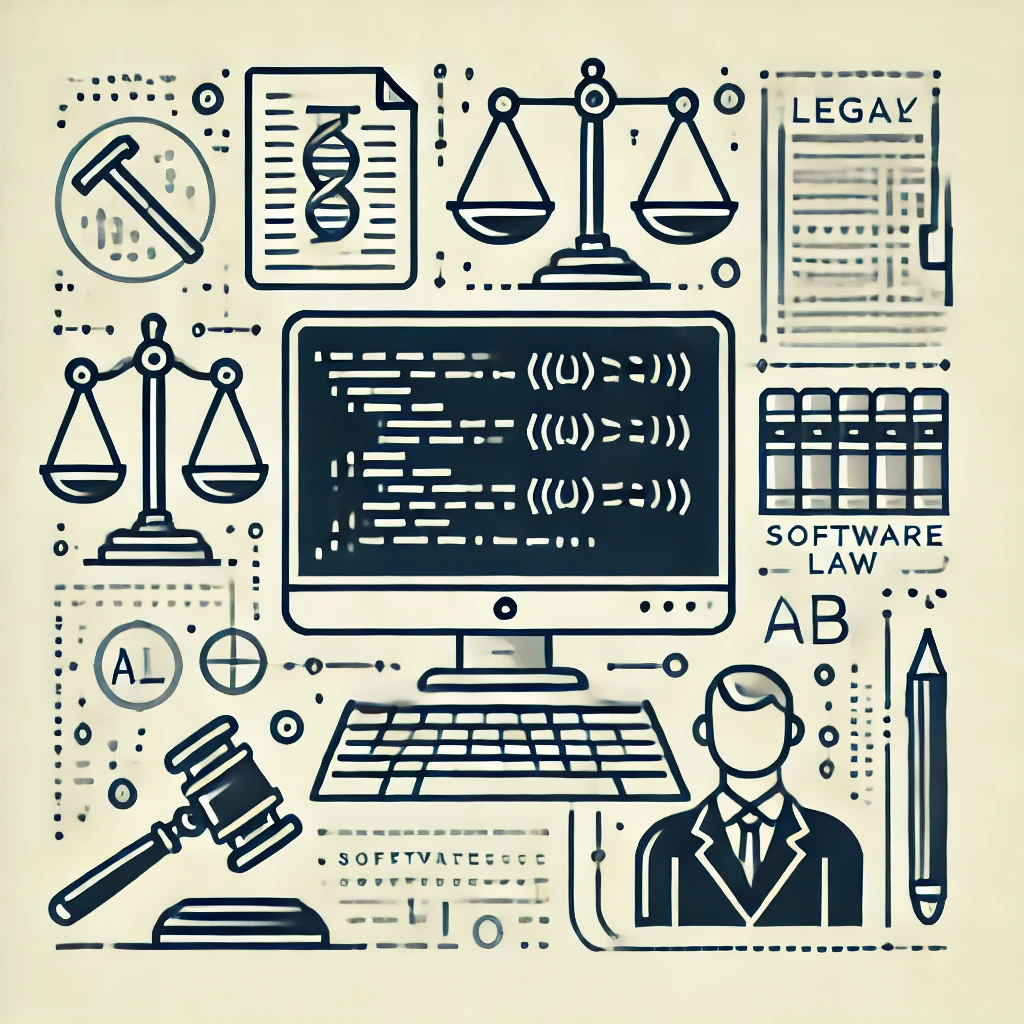Germany, being one of the largest economies in Europe, has a robust legal framework governing software development and distribution. Understanding the legal issues surrounding software in this jurisdiction is crucial for developers, companies, and distributors working with software in the German market. Drawing on recent blog posts, this article aims to provide an overview of Germany’s software law, focusing on recurring legal problems faced by companies.
1. Intellectual Property and Copyright Protection of Software
In Germany, the primary legislation protecting software is the Copyright Act (Urheberrechtsgesetz, UrhG). Software is explicitly considered a literary work under § 69a UrhG, and it enjoys copyright protection from the moment it is created. This protection applies not only to the software’s source code but also to its overall structure and organization.
However, not every piece of code qualifies for protection. In one of your blog posts, it was highlighted that “Code snippets”—small pieces of code—can only be protected if they are sufficiently original and creative. For example, everyday code snippets or simple commands do not meet the threshold for copyright protection. This distinction often leads to disputes about what constitutes an “original” piece of software that can be protected by copyright.
Key takeaway: Developers and companies must ensure that their software contains enough originality to warrant copyright protection and should be cautious when using standard or generic code.
2. Software Licenses and Usage Rights
Software is commonly distributed under licensing agreements. In Germany, there are two primary types of software licenses:
- Proprietary licenses: Where the software’s source code is not accessible, and users must abide by strict usage terms.
- Open-source licenses: These allow users to freely use, modify, and distribute the software, provided they adhere to the terms of the open-source license.
Your blog also delves into the complexities surrounding used software. A landmark European Court of Justice (ECJ) decision confirmed that companies can resell licenses for second-hand software, including software distributed via download. However, this resale is subject to certain conditions, such as ensuring that the original owner has deleted their copy and no longer uses the license.
Key takeaway: When buying or selling software, it is crucial to verify the licensing terms and ensure compliance with both German and EU law. The resale of used software is allowed, but only under specific conditions.
3. Software Development Contracts
In Germany, software development agreements must clearly define the scope of work, timelines, deliverables, and payment terms. One common legal issue is the distinction between work contracts (Werkvertrag) and service contracts (Dienstvertrag):
- A Werkvertrag requires the developer to deliver a specific, tangible result (e.g., completed software).
- A Dienstvertrag, on the other hand, obligates the developer to provide a service without necessarily delivering a final product.
This distinction is important because it affects the warranties and liabilities attached to the software development process. For instance, under a Werkvertrag, the developer is typically liable if the software fails to meet the agreed-upon specifications.
Key takeaway: Companies must carefully draft software development contracts to ensure the correct legal framework is applied, particularly with regard to warranties and liability.
4. Liability for Software Defects
Defects in software can result in significant legal and financial consequences. Under German law, software developers and sellers can be held liable for defective products. This liability can arise under:
- Contract law: If the software does not meet the agreed-upon functionality, the developer may be liable for breach of contract.
- Product liability law: In some cases, defective software may cause damage, in which case the developer could be liable under product liability law.
To mitigate these risks, it is essential to include limitation of liability clauses in software contracts. These clauses should define the scope of liability and any potential caps on damages. However, German law prohibits the exclusion of liability for intentional misconduct or gross negligence.
Key takeaway: Properly drafted liability clauses are essential to protect against unforeseen software defects and potential damages.
5. Data Protection and Software Compliance
With the implementation of the General Data Protection Regulation (GDPR), software developers must ensure that their products comply with data protection laws, especially if the software processes personal data. Non-compliance can lead to heavy fines and legal actions.
In your blog, the importance of privacy by design and privacy by default principles in software development was emphasized. This means that privacy considerations must be integrated into the software development process from the beginning, and default settings should ensure the highest level of data protection.
Key takeaway: Data protection compliance is a significant concern in software development. Companies must ensure that their software complies with GDPR, particularly regarding user data collection, storage, and processing.

Software law as an area of law is very comprehensive and demanding: from contract law to copyright law including licensing law to competition law issues, there is a lot at play here. The fact that modern development relies on artificial intelligence does not make it any easier – seek advice at an early stage and do not complete projects only to have to make improvements afterwards!
6. Software Patentability and Functionality
Another issue frequently encountered in the German software industry is the patentability of software. Under German and EU law, software as such cannot be patented. However, if the software provides a technical solution to a problem, it may be eligible for patent protection. This has led to numerous disputes about whether certain software innovations meet the technical criteria necessary for patenting.
Additionally, as your blog highlighted, the functionality of software—such as the way a program operates or the format in which it processes data—cannot be protected by copyright alone. This was clarified by a European Court of Justice (ECJ) ruling, which stated that while the specific code is protected, the underlying ideas and principles behind the software’s functionality are not.
Key takeaway: Companies should explore both copyright and patent protections to safeguard their software, but they must understand the limitations of each approach.
Conclusion
The legal landscape for software development and distribution in Germany is complex, covering everything from copyright and licensing to liability and data protection. Companies must navigate these legal challenges carefully to ensure compliance and protect their intellectual property. By understanding the key legal issues outlined above, businesses can better manage the risks associated with software development and distribution in the German market.
For more detailed advice on navigating German software law, please consult us as a specialized lawyer.
- Understanding cyber diplomacy as a strategic necessity - 19. June 2025
- Israel and Iran: Cyber Espionage, Cyber Warfare and Cyber Defense in Comparison - 19. June 2025
- Israel: Cyber Espionage, Cyber Warfare and Cybersecurity - 19. June 2025

